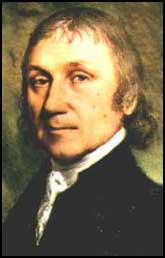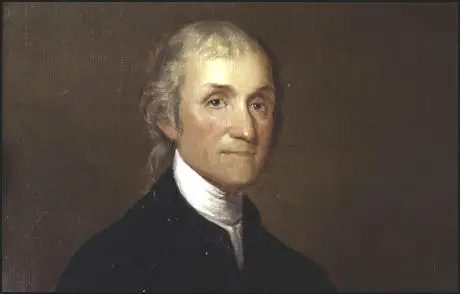Joseph Priestley

Joseph Priestley, the son of a cloth-dresser from Leeds, was born in 1733. After the death of his mother in 1740, Joseph lived with his aunt, a person with strong nonconformist religious views. Priestley went to the local grammar school but after three years ill-health forced him to return home. Joseph was a brilliant student and with the help of local teachers, Joseph became proficient in physics, philosophy, algebra, mathematics and several different languages.
After his health improved, Joseph Priestley entered the new nonconformist Daventry Academy in Northamptonshire, where he studied history, science and philosophy. At Daventry he read David Hartley's Observations of Man (1749). Priestley was deeply influenced by Hartley's views on free will and the notion of human perfectibility through good education.
In 1755 Joseph Priestley became a minister at the Presbyterian church at Needham Market. Three years later he moved to Nantwich in Cheshire. Priestley also opened a small school where he developed his ideas on education. He was especially interested in exploring how science could improve the quality of human life. In 1761 Priestley was appointed as tutor at the dissenting Warrington Academy in Lancashire.
While at Warrington Joseph Priestley wrote Liberal Education for Civil and Active Life (1765). In the book he stressed the importance of science, arts, modern languages and history and argued they were better suited than the classics for those students who wanted a career in industry and commerce. This was followed by a book on science The History and Present State of Electricity (1767). In the book Priestley put forward the theory that the history of science was important because it showed how human intelligence discovers and directs the forces of nature, as well as illustrating the general progress of mankind.
Joseph Priestley now turned his attention to politics. In 1768 his book The First Principles of Government and the Nature of Political, Civil and Religious Liberty was published. In the book he argued for the development of a political system that maximizes civil liberty. In a statement that was to have an influence on the work of Jeremy Bentham and his ideas on Unitarianism, Priestley wrote: "The good and happiness of the members, that is the majority of the members of the state, is the great standard by which every thing relating to that state must finally be determined."
These three books brought Priestley to the attention of Richard Price and Benjamin Franklin. Both men became friendly with Priestley and encouraged his work in science and politics. After long discussions with the two men, Priestley wrote The State of Public Liberty in General and of American Affairs in Particular (1774). The pamphlet attacked the British government for depriving the colonists their rights and liberties.
Priestley's political beliefs made him unpopular with the British government. Church leaders were also concerned with the religious views expressed by Priestley in books such as The History of the Corruptions of Christianity (1782) and History of Early Opinions Concerning Jesus Christ (1786). The books developed Priestley's ideas on Unitarianism. They also included attacks on such doctrines as the virgin birth and the Holy Trinity. Many people, including King George III, became convinced that Priestley was now an atheist.
Priestley moved to Birmingham where he became friends with businessmen and scientists such as John Wilkinson, Josiah Wedgwood, Matthew Boulton and James Watt. Whereas Priestley's scientific work, for example, his discovery of oxygen, was welcomed, his religious and political views were constantly getting him into trouble. Priestley and his friend Richard Price became leaders of a group of men that became known as the Rational Dissenters. To the government, these were dangerous men.
Hostility towards Joseph Priestley increased in 1791 when he wrote a pamphlet defending the French Revolution. Priestley argued that he believed the events in France increased the chance of "universal peace and goodwill among all nations" as it made possible an "empire of reason". His predictions that the French Revolution heralded a change in the role of the monarchy upset King George III. The king and his supporters particularly disliked Priestley's view that in future monarchs will be the "first servants of the people and accountable to them". Priestley now obtained the nickname 'Gunpowder' after he expressed the view that it should be placed "under the old building of error and superstition".

In 1791 Priestley published A Political Dialogue on the General Principles of Government. In the book Priestley expressed similar political ideas to those expressed by Tom Paine in the Rights of Man. Later that year Priestley took part in forming a Constitutional Society in Birmingham. Tories in the city made inflammatory speeches attacking Priestley's political ideas and this resulted in a mob breaking into his house and destroying most of his papers, books and scientific equipment.
After the Birmingham riots Priestley moved to London where he taught history and science at New College, Hackney. Priestley experienced a great deal of hostility in London for his political and religious beliefs and in 1774 he decided to emigrate to America. He settled in Pennsylvania and over the next few years he wrote several books on Unitarianism. Priestley also established the first Unitarian Church in America.
Joseph Priestley died on 6th February, 1804.
Slavery in the United States (£1.29)
Primary Sources
(1) Joseph Priestley, An Essay on the First Principles of Government (1768)
In the largest states, if the abuses of government should, at any time be great and manifest; if the servants of the people, forgetting their masters, and their masters' interest, should pursue a separate one of their own; if, instead of considering that they are made for the people, they should consider the people as made for them; if the oppressions and violations of right should be great, flagrant, and universally resented; if the tyrannical governors should have no friends but a few sycophants, who had long preyed upon the vitals of their fellow citizens, and who might be expected to desert a government, whenever their interests should be detached from it: if, in consequence of these circumstances, it should become manifest, that the risk, which would be run in attempting a revolution would be trifling, and the evils which might be apprehended from it, were far less than these which were actually suffered, and which were daily increasing; in the name of God, I ask, what principles are those, which ought to restrain an injured and insulted people from asserting their natural rights, and from changing, or even punishing their governors that is their servants, who had abused their trust; or from altering the whole form of their government, if it appeared to be of a structure so liable to abuse?
To say that these forms of government have been long established, and that these oppressions have been long suffered, without any complaint, is to supply the strongest argument for their abolition. Nothing can more justly excite the indignation of an honest and oppressed citizen, than to hear a prelate, who enjoys a considerable benefice, under a corrupt government, pleading for its support by those abominable perversions of scripture, which have been too common on this occasion; as by urging in its favour that passage of St Paul, "The powers which be are ordained of God", and others of a similar import. It is a sufficient answer to such an absurd quotation as this, that, for the same reason, the powers which will be will be ordained of God also.
It will be said, that it is opening a door to rebellion, to assert that magistrates, abusing their power, may be set aside by the people, who are of course their own judges when that power is abused. May not the people, it is said, abuse their power, as well as their governors? I answer, it is very possible they may abuse their power: it is possible they may imagine themselves oppressed when they are not: it is possible that their animosity may be artfully and unreasonably inflamed, by ambitious and enterprising men, whose views are often best answered by popular tumults and insurrections; and the people may suffer in consequence of their folly and precipitancy. But what man is there, or what body of men (whose right to direct their own conduct was never called in question) but are liable to be imposed upon, and to suffer in consequence of their mistaken apprehensions and precipitate conduct?
English history will inform us, that the people of this country have always borne extreme oppression, for a long time before there has appeared any danger of a general insurrection against the government.
(2) Michael Faraday, Address delivered at the Commemoration of the Centenary of the Birth of Dr Priestley (1833)
Dr. Priestley had that freedom of mind, and that independence of dogma and of preconceived notions, by which men are so often bowed down and carried forward from fallacy to fallacy, their eyes not being opened to see what that fallacy is. I am very anxious at this time to exhort you all, - as I trust you all are pursuers of science, - to attend to these things; for DR Priestley made his great discoveries mainly in consequence of his having a mind which could be easily moved from what it had held to the reception of new thoughts and notions; and I will venture to say that all his discoveries followed from the facility with which he could leave a preconceived idea.


